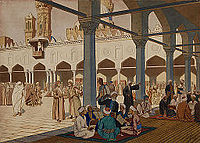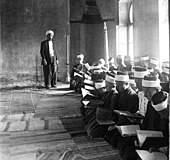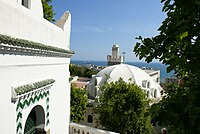Nass al-Houdhour
| Part of a series on |
| Algerian Islamic reference |
|---|
| Part of a series on Islam Sufism |
|---|
 |
|
|
The Nass al-Houdhour (Arabic: ناس الحضور) are second rank Hezzabine reciting the Hizb Rateb and Salka in mosques and zawiyas in Algeria according to the Algerian Islamic reference under the supervision of the Ministry of Religious Affairs and Endowments.[1][2]
History
[edit]The mosques in Algeria employ many supporting Hezzabine called Nass al-Houdhour supervised by the Hezzabine and the Bash Hezzab along with other employees who take care of these buildings of Muslim ibadah.[3][4]
Historically, the mosque of Djamaa el Kebir in the Casbah of Algiers was served by the mufti of Algiers assisted by two Imams, under their authority are placed a Moudaris, explicator of the Quran, a Bash Hezzab, head of the readers, six Hezzabine of first class, twelve Hezzabine of second class and four Nass al-Houdhour.[5][6]
During the French colonization of Algeria, the annual salary of each one of the Hafiz belonging to Nass al-Houdhour was around 5,000 old French francs.[7][8]
But this annual salary varied in value according to the competence of the Hafiz, the importance of the mosque in which he practiced his recitation (tilawa), as well as the importance of the city where he worked.[9][10]
The reciters of the Nass al-Houdhour were considered as Talibes students paid for their sound performances and attendance in the large well-organized and structured mosques.[11][12]
According to the circular of 17 May 1851 relating to the organization of Muslim worship (Ibadah) in Algeria, the Nass al-Houdhour were defined as trainee students designated as Tolba intended for the functions of Muslim worship, and who regularly attend public courses open in mosques.[13]
While the salary payments attributed to senior staff of the Muslim religion such as muftis and imams were charged to the budget of the then colonized Algeria; salaries for lower staff, such as Nass al-Houdhour, and general mosque maintenance costs were borne by the local budget and municipalities.[14]
Functions
[edit]For qualified Tolbas like Nass al-Houdhour, the term “Houdhour” literally means “Assistance and Presence”, and this title applies to the meeting of tolba who assiduously follow the lessons of the mouderris in first-class Algerian mosques.[15][16]
The Nass al-Houdhour are the Houfaz and Qaris who are part of this studious assembly, and who attend the reading and the explanations of the books most in honor among Muslims, like Sahih Bukhari.[17][18]
The function of Nass al-Houdhour was an integral part of a clerical organization imposed on Algerian mosques and composed of muftis, imams, hezzabines, muezzins and other posts.[19]
This structuring of the tasks of the Muslim cult was part of an institutional tendency opting for uniformity and hierarchy.[20]
Gallery
[edit]-
Hezzabine reading the Hizb Rateb
-
Hezzabine reading the Hizb Rateb
-
Hezzabine reading the Hizb Rateb
See also
[edit]- Ministry of Religious Affairs and Endowments
- Algerian islamic reference
- Islam in Algeria
- Religion in Algeria
- Muftis in Algiers
- Zawiyas in Algeria
- List of mosques in Algeria
- Djamaa el Djazaïr
- Djamaa el Kebir
- Warsh recitation
- Idjaza
- Hizb Rateb
- Hezzab
- Bash Hezzab
- Salka
- Raising hands in Dua
- Tawassul
- Tilawa
- Sujud Tilawa
References
[edit]- ^ https://www.marw.dz/
- ^ Fillias, Achille (1865). "Nouveau. Guide general du voyageur en Algerie par ---(etc.)".
- ^ بوهند, خالد (August 2020). النخب الجزائرية: 1892–1942. المركز العربي للأبحاث ودراسة السياسات. ISBN 9786144453506.
- ^ "Almanach de l'Algerie. Guide du Colon, Publie d'apres les documents fournis par le Ministere de Guerre". 1853.
- ^ Algeria (1896). "Code de l'Algérie annoté: Recueil chronologique des lois, ordonnances, décrets, arrêtés, circulaires, etc., formant la législation algérienne actuellement en vigeur, avec les travaux préparatoires et l'indication de la jurisprudence, suivi d'une table alphabétique de concordance".
- ^ Galibert, Léon (1754). "L'Algérie, ancienne et moderne depuis les premiers etablissements des Carthaginois jusqu'a lexpédition du général Randon en 1853".
- ^ Cantier, Jacques (March 2002). L' Algérie sous le régime de Vichy. Odile Jacob. ISBN 9782738182906.
- ^ "Tableau de la situation des établissements Français dans l'Algérie: Précédé de l'exposé des motifs et du projet de loi portant demande de crédits extraordinaires au titre de l'exercice 1838. ... 1846 - 1847 - 1848 - 1849". 1851.
- ^ "L'Ami de la religion". 1852.
- ^ "The Sportsman".
- ^ Algeria (1896). "Code de l'Algérie annoté: Recueil chronologique des lois, ordonnances, décrets, arrêtés, circulaires, etc., formant la législation algérienne actuellement en vigeur, avec les travaux préparatoires et l'indication de la jurisprudence, suivi d'une table alphabétique de concordance".
- ^ Carleton, John William (1869). "The Sporting review, ed. By 'Craven'".
- ^ Algeria; Sautayra, Edouard (1883). "Législation de l'Algérie: Lois, ordonnance, décrets et arrêtés par ordre alphabétique".
- ^ Fillias, Achille (1862). "Etat actuel de l'Algérie. Géographie physique et politique de l'Algérie. Description... Population, moeurs et coutumes, commerce et industrie, administration. Dictionnaire géographique et historique de toutes les localités".
- ^ Depont, Octave; Coppolani, Xavier (1897). "Les confréries religieuses musulmanes".
- ^ Malte-Brun, Conrad (1865). "Géographie universelle de Conrad Malte-Brun, entièrement refondue et mise au courant de la science par Th. Lavallée".
- ^ Weiss, André (1897). "Pandectes françaises: Nouveau répertoire de doctrine, de législation et de jurisprudence".
- ^ "Bulletin trimestriel". 1897.
- ^ "Bulletin trimestriel de géographie et d'archéologie". 1897.
- ^ MacCarthy, Oscar (1858). "Géographie physique, économique et politique de l'Algérie".









